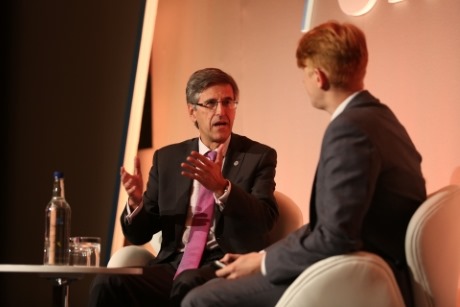Westinghouse balances new and existing fleet needs
19 September 2016
Two Westinghouse AP1000s are likely to start up within a year, with hot functional tests at the first-of-a-kind reactor at Sanmen in China on course to finish next month, interim president and CEO José Emeterio Gutiérrez told delegates at the World Nuclear Association's Annual Symposium held in London last week. Fuel loading at Sanmen is expected to take place before the end of the year.
 |
| José Emeterio Gutiérrez (L) at the Annual Symposium (Image: World Nuclear Association) |
Hot functional testing is also under way at the second AP1000, Haiyang 1, and is making faster progress thanks to the experience and lessons learned at Sanmen 1. Two units are under construction at each site.
"Hopefully, very soon we will have four AP1000s connected to the grid in China," Gutiérrez said.
Lessons learned from the Chinese AP1000 projects are also being applied to the AP1000s under construction in the USA. These units, at VC Summer and Vogtle, are about two years behind the Chinese plants, Gutiérrez said. Summer 2 passed a major milestone recently with the installation of its reactor pressure vessel, and Gutiérrez said a similar milestone would be reached at Vogtle 3 "within weeks".
Westinghouse is "very optimistic", he said, about the prospect of AP1000 construction in India: "There is strong commitment from the government of India, specifically from Prime Minister Modi, to grow nuclear in India." He cited Modi's public statement, made during a visit to Washington DC earlier this year, that he was "minded to support" Westinghouse's project. Working with Indian partners, this would see construction of six AP1000s with a commitment to having an EPC contract in place by June 2017.
A site has already been allocated, and negotiations are ongoing with customers and partners in India, Gutiérrez said. "Hopefully by this time next year, we will be talking about a real project, and a project under construction," he said.
Westinghouse's global reach has enabled it to transfer and share both resources and experience between its projects in China, the USA, India and the UK, he said. The AP1000 design is approaching the end of the UK regulatory generic design assessment (GDA) process, which it is expected to complete in the first quarter of 2017.
SMR excitement
As well as the AP1000 - which NuGen plans to build at Moorside in West Cumbria - Westinghouse has also proposed its small modular reactor (SMR) for use in the UK. The UK government earlier this year announced a competition to identify the best value SMR for possible future deployment in the country. Completion of the AP1000 GDA would be a "very important milestone" and Westinghouse is "very excited" about its SMR, Gutiérrez said.
The Westinghouse SMR would benefit from the company's experience of licensing a reactor in the UK, he added. It incorporates many of the passive safety features from the AP1000 which have already been licensed, and the reactor is therefore not entirely a first-of-a-kind design using new technology, he said. He also noted that Westinghouse has a large footprint in the UK, with fuel production facilities at Springfields that have already been qualified to manufacture SMR fuel, and an established supply chain. These and other considerations make development and deployment of SMR technology in the UK a "real opportunity" in the short term, he said.
While working with customers to maximise localisation in their nuclear supply chain, Westinghouse's global reach and flexibility could further leverage opportunities for increased efficiencies, Gutiérrez said. This could be achieved by combining resources and bringing in global experience and ready-qualified suppliers, where appropriate.
Existing fleet
While new build was "wonderful," Guitérrez said Westinghouse remained focused on providing support and services to keep the world's existing nuclear fleet in operation. "We cannot forget that we have more than 400 reactors in operation today […] Those reactors must continue operating safely and economically," he said.
He confirmed that Westinghouse is looking to invest in technologies and "new ideas" in the decontamination and decommissioning (D&D) area. "Unfortunately, the D&D business is growing," he said, referencing recent nuclear power plant closures. He said it was "important to recognise" that the nuclear industry is expected to restore and clean its retired facilities and sites, to protect the environment and to "take care" of all of its waste. "There are technologies, there are solutions, and Westinghouse is working on them," he said.
Researched and written
by World Nuclear News